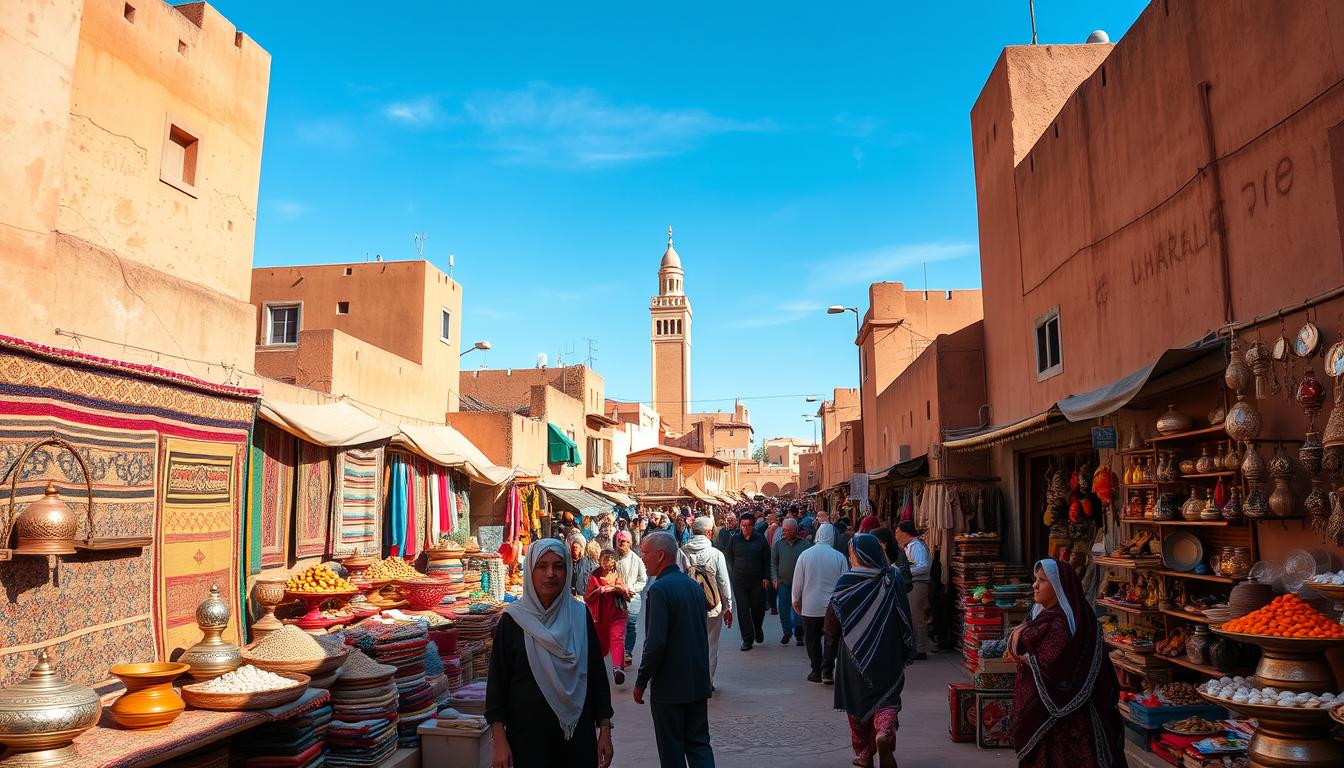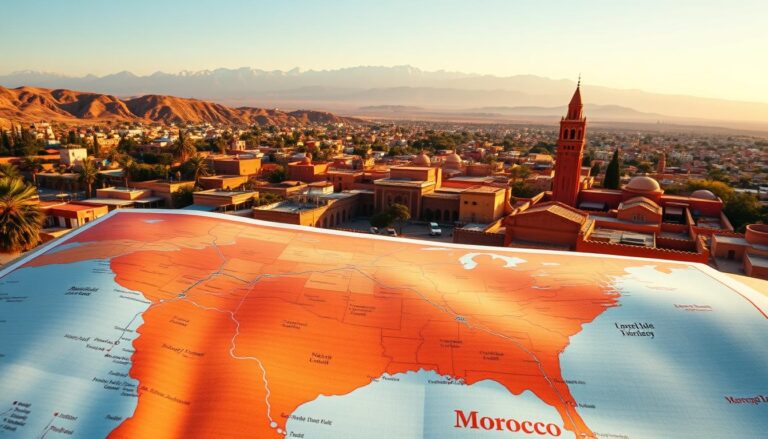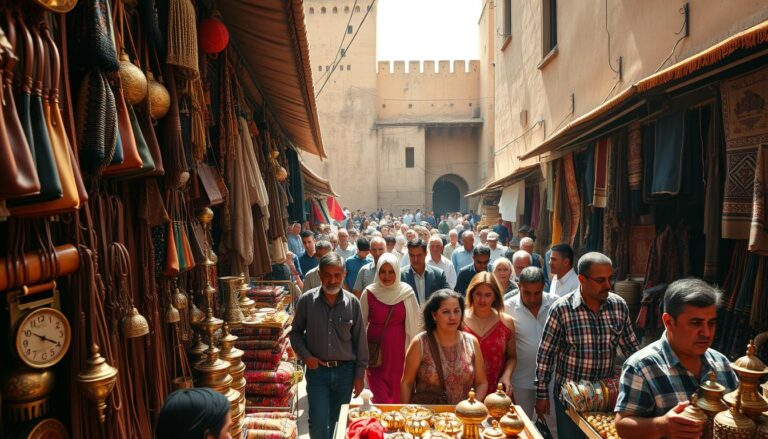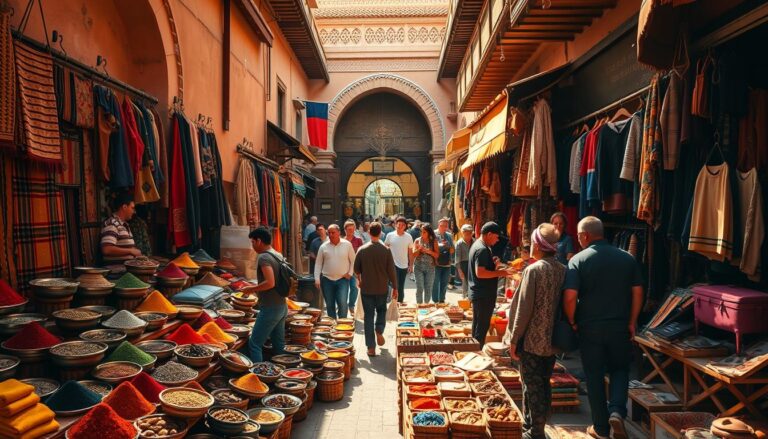10 Things You Should Not Do When Traveling to Morocco
Traveling to Morocco can be a rich and rewarding experience, offering a blend of vibrant culture, stunning landscapes, and warm hospitality. However, to truly appreciate the beauty of this North African country, it’s essential to be mindful of local customs and traditions.
Understanding and respecting cultural norms can make a significant difference in your travel experience. Morocco, with its conservative values and unique cultural practices, requires visitors to be aware of certain behaviors that might be considered offensive or inappropriate.
By being informed about the common cultural mistakes to avoid, travelers can ensure a more enjoyable and respectful journey.
Key Takeaways
- Understand local customs and traditions
- Be aware of cultural norms and practices
- Respect conservative values
- Avoid common cultural mistakes
- Ensure a respectful and enjoyable journey
The Cultural Context of Morocco: What Travelers Should Know
As you prepare for your Moroccan adventure, understanding the cultural context is crucial for a respectful and enriching experience. Morocco’s rich cultural heritage is a complex blend of Arab, Berber, and European influences that have shaped the country’s unique identity over centuries. This diverse cultural landscape is reflected in the vibrant cities, historic landmarks, and traditional practices that travelers will encounter.
The Unique Blend of Arab, Berber, and European Influences
Morocco’s cultural identity is a fascinating mix of Arab, Berber (Amazigh), and European influences. The Arab conquest of Morocco in the 7th century introduced Islam and the Arabic language, which have had a profound impact on the country’s culture and identity. The Berber community, indigenous to Morocco, has maintained its distinct cultural practices, language, and traditions despite Arabization. Meanwhile, European colonization, particularly by France and Spain, has left a legacy in Morocco’s architecture, cuisine, and administrative systems.
Why Cultural Sensitivity Matters in Morocco
Cultural sensitivity is vital when traveling to Morocco, as the country is predominantly Muslim and values modesty and respect. Being mindful of local customs, such as dressing modestly and respecting Ramadan, can significantly enhance your experience. It not only fosters positive interactions with locals but also ensures that you avoid unintentionally offending your hosts or the local community.
Setting Expectations for Your Moroccan Adventure
To fully appreciate Morocco’s rich cultural heritage, it’s essential to set realistic expectations about what your journey will entail. Understanding that Morocco is a conservative society with strong religious and cultural traditions can help travelers navigate the complexities of local customs and etiquette. By being aware of these cultural nuances, you can better appreciate the beauty and diversity that Morocco has to offer, from its bustling souks to its serene natural landscapes.
1. Don’t Dress Disrespectfully or Inappropriately
Dressing modestly is a sign of respect for Morocco’s cultural and religious heritage. When traveling to Morocco, it’s essential to understand the local dress code to avoid unintentionally offending the locals.
Morocco is a conservative country with a rich cultural history, and the way you dress can significantly impact your travel experience and interactions with the locals. The country’s unique blend of Arab, Berber, and European influences is reflected in its dress norms, which vary between urban and rural areas.
Modest Clothing Guidelines for Women Travelers
Women travelers should prioritize modest clothing that covers their shoulders and knees, especially when visiting mosques or rural areas. Loose-fitting clothing that is not revealing or provocative is recommended. A scarf or shawl can be a useful accessory to cover the shoulders or head when needed.
Appropriate Attire for Men
Men should also dress modestly, avoiding revealing or tight clothing. While the dress code for men is generally more relaxed than for women, it’s still important to be mindful of the local customs, especially in rural areas or when visiting mosques.
Regional Differences: City vs. Rural Dress Codes
The dress code in Morocco varies significantly between urban and rural areas. In cities like Marrakech or Rabat, you can observe a more relaxed attitude towards dressing, with a blend of modern and traditional attire. However, in rural areas, the dress code tends to be more conservative, and visitors are expected to dress more modestly as a sign of respect for the local culture.
| Region | Dress Code |
|---|---|
| Urban Areas | More relaxed, modern, and traditional attire |
| Rural Areas | More conservative, modest clothing |
2. Don’t Disregard Religious Customs and Sensitivities
Morocco is a country with a rich Islamic heritage, and respecting its religious practices is crucial for a harmonious visit. The majority of Moroccans are Muslims, and their daily lives are influenced by Islamic traditions. As a traveler, being aware of and respecting these customs can significantly enhance your experience.
Respecting Prayer Times and Religious Practices
Morocco is an Islamic country where prayer times are an integral part of daily life. There are five obligatory prayers, known as Salat, which are performed at specific times of the day. Being mindful of these prayer times, especially during the call to prayer from the minarets, is a sign of respect. It’s also worth noting that the azan or call to prayer is broadcast from minarets five times a day, and hearing it can be a profound experience.
- Try to avoid scheduling important activities during prayer times.
- Be respectful if you encounter people praying; keep a distance and avoid interrupting.
Mosque Etiquette for Non-Muslim Visitors
While some mosques in Morocco are open to non-Muslim visitors, it’s crucial to follow the rules. For instance, you should remove your shoes before entering, and sometimes, there are specific areas designated for non-Muslims.
- Dress modestly; cover your shoulders and knees.
- Be prepared to be respectful and quiet inside the mosque.
Special Considerations During Ramadan
Ramadan is a holy month of fasting for Muslims, where they abstain from food and drink from dawn till dusk. During this period, it’s essential to be particularly considerate.
- Avoid eating or drinking in public during fasting hours as a sign of respect.
- Be patient and understanding if services or responses seem slower than usual.
By being mindful of Morocco’s religious customs and practices, you not only show respect to the local culture but also enrich your travel experience. Understanding and adhering to these simple considerations can make your visit to Morocco more enjoyable and meaningful.
3. Don’t Take Photos of People Without Permission
Morocco is a photographer’s paradise, but taking pictures of locals requires an understanding of their attitudes toward photography. The country’s rich cultural heritage and diverse landscapes make it a treat for photographers, yet it’s vital to respect local norms when capturing images of people.
Understanding Local Attitudes Toward Photography
In Morocco, attitudes toward photography vary significantly between urban and rural areas. In cities like Marrakech and Fez, locals are generally more accustomed to being photographed, especially in tourist areas. However, in rural areas, people may be more conservative and less comfortable with being photographed.
How to Respectfully Ask for Photo Permission
When you want to take a photo of someone, it’s polite to ask for their permission first. A simple greeting and a gesture indicating your intention to take a photo can go a long way. Learning a few basic Arabic phrases, such as “Maghribi?” (May I take your photo?), can be helpful. Be prepared to offer a small tip or gift in some cases, as this is considered courteous.
Restricted Photography Locations and Situations
There are certain locations and situations where photography is restricted or requires special permission. These include government buildings, military areas, and some religious sites. It’s also important to be respectful when photographing during religious events or ceremonies. Always check with local guides or authorities to understand specific restrictions.
4. Don’t Skip Learning Basic Haggling Etiquette
When venturing into Morocco’s vibrant markets, mastering the art of haggling is crucial for a successful and enjoyable shopping experience. Haggling is an integral part of the shopping culture in Morocco, and understanding how to navigate it respectfully can make a significant difference in your interactions with local vendors.
Markets Where Haggling is Expected
In Morocco’s bustling souks and markets, haggling is not just common; it’s expected. Visitors should be prepared to negotiate prices in most traditional markets, especially when shopping for goods like textiles, jewelry, and handicrafts. The souks in Marrakech, Fez, and other major cities are renowned for their vibrant atmosphere and the opportunity to engage in lively bargaining.
The Art of Respectful Price Negotiation
To haggle effectively and respectfully, start by researching the market value of the item you’re interested in. Begin with a lower offer than you’re willing to pay, and be prepared to meet the vendor halfway. It’s essential to maintain a friendly and polite demeanor throughout the negotiation. Remember, haggling is a two-way conversation; listen to the vendor’s perspective and be willing to walk away if the price isn’t right. This approach not only helps you get a fair deal but also builds a positive rapport with the seller.
When Fixed Prices Apply: Where Not to Haggle
While haggling is a staple in traditional markets, there are instances where fixed prices apply. Modern shopping centers, supermarkets, and some upscale stores typically have non-negotiable prices. It’s also worth noting that some vendors may indicate fixed prices by clearly labeling their goods. Always be mindful of your surroundings and the vendor’s attitude to determine whether haggling is appropriate.
5. Don’t Make These Food and Dining Etiquette Mistakes
When traveling to Morocco, understanding the local dining etiquette is crucial for a respectful and enjoyable experience. Moroccan cuisine is known for its rich flavors and cultural significance, and mealtimes are often seen as opportunities to bond with family and friends.

The Right-Hand Rule for Eating
In Morocco, it’s customary to eat with your right hand. This practice is rooted in cultural and hygiene considerations. Using your left hand can be seen as impolite, so it’s essential to respect this tradition. If you have any difficulties, don’t hesitate to ask for assistance or use utensils if provided.
Navigating Communal Dishes and Shared Meals
Moroccan meals are often communal, with several dishes placed in the center of the table for everyone to share. When dining in this setting, it’s polite to take food from the dishes closest to you and to wait for the host to indicate where to start. Using serving utensils when available is also a sign of respect.
How to Politely Decline Food or Drink Offerings
When offered food or drink, it’s considered polite to accept at least a small portion. However, if you need to decline, you can say “No, thank you” or “Shukraan” (thank you) in Arabic. If you’re offered a refill, you can say “Baraka Allahu fik” (God bless you for your kindness), which is a gracious way to decline further offerings.
Some key dining etiquette tips to keep in mind include:
- Always use your right hand when eating.
- Be prepared to share food and drinks with others.
- Learn basic Arabic phrases like “Shukraan” to express gratitude.
- Wait for the host to start eating before you begin.
By being mindful of these dining etiquette rules, you can enjoy Morocco’s culinary delights while showing respect for the local culture.
6. Don’t Overlook Water and Food Safety Precautions
When exploring Morocco, it’s essential to prioritize health by being mindful of what you eat and drink. Ensuring a safe and enjoyable trip involves being aware of the risks associated with food and water. Morocco, with its rich culinary heritage, offers a variety of delicious dishes, but travelers must be cautious to avoid health issues.
Safe Drinking Water Practices
One of the primary concerns for travelers in Morocco is access to safe drinking water. Tap water is generally not recommended for drinking, especially for tourists whose stomachs are not accustomed to local water bacteria. Stick to bottled or filtered water for drinking and brushing your teeth. It’s also wise to avoid ice made from tap water in drinks. Many hotels and riads (Moroccan houses with interior gardens) provide bottled water, so don’t hesitate to ask if you’re unsure.
Street Food: What’s Safe and What to Avoid
Morocco is famous for its street food, from savory tagines to sweet pastries. While it’s tempting to dive into the local cuisine, it’s crucial to choose stalls and vendors that are popular with locals and have a high turnover of food, indicating freshness. Avoid undercooked meat, dairy, or raw vegetables from street vendors, as these can be risky. Opt for cooked and hot food, which is generally safer.
Preparing for and Handling Potential Stomach Issues
Despite best efforts, if you do encounter stomach issues, it’s essential to be prepared. Carry oral rehydration salts or antacids as a precaution. In case of severe or persistent stomach issues, seek medical attention at a local clinic or hospital. Moroccan pharmacies are generally well-stocked, but it’s best to have a basic understanding of medications and their local names. Knowing a few key phrases in Arabic, like “doctor” (دكتور – doktor), can be very helpful.
“Prevention is better than cure,” especially when it comes to food and water safety while traveling.
In conclusion, being mindful of food and water safety is crucial for a healthy and enjoyable trip to Morocco. By taking simple precautions and being aware of the potential risks, travelers can fully immerse themselves in the rich culinary culture that Morocco has to offer.
7. Don’t Fall Victim to Common Tourist Scams
To ensure a smooth and enjoyable trip to Morocco, understanding the local scam landscape is essential. Tourists often become targets for various scams, ranging from fake guides to transportation and shopping scams.
Identifying and Avoiding Fake Guides
One of the most common scams involves fake guides who offer to show you around, especially in popular areas like Marrakech’s Jemaa el-Fnaa. To avoid falling victim, always research and book guides through reputable sources. Be wary of overly friendly locals who approach you with unsolicited offers. Verify their credentials and check if they are registered with the local tourism authorities.
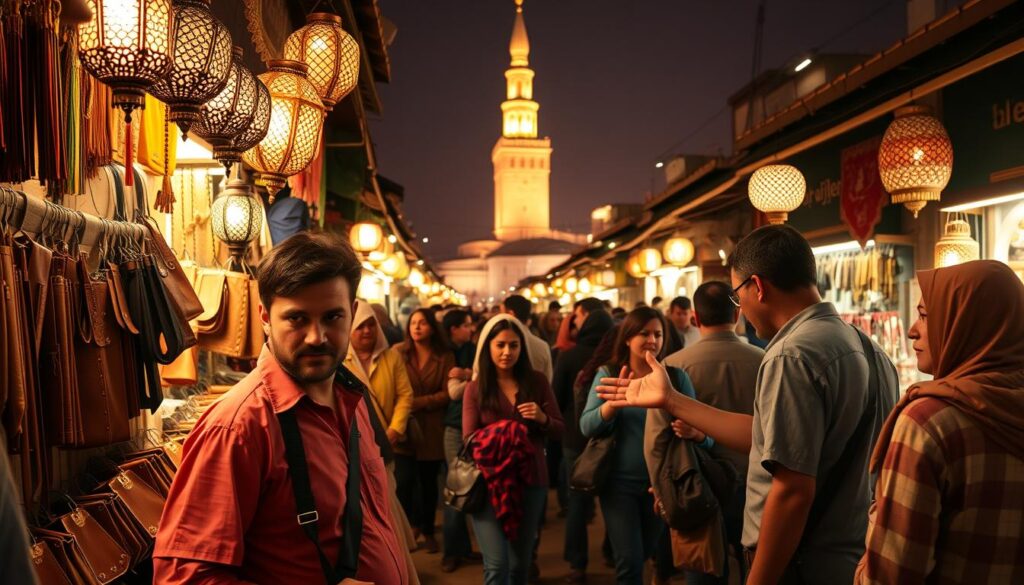
Transportation Scams and How to Prevent Them
Transportation scams often involve overcharging or taking longer routes to your destination. To avoid this, agree on the fare before you start your journey or use reputable taxi services that offer fixed rates. Additionally, consider using ride-hailing apps when available, as they provide transparent pricing.
Shopping Pitfalls: Authenticity and Fair Pricing
When shopping, be cautious of counterfeit goods and inflated prices. Purchase from reputable stores and don’t be afraid to walk away if the deal seems too good to be true. Understanding the local market prices can also help you make informed purchasing decisions.
By being aware of these common scams and taking preventive measures, you can significantly enhance your safety and enjoyment while traveling in Morocco.
8. Don’t Mishandle Money, Tipping, and Currency Issues
To fully enjoy Morocco without financial stress, it’s vital to grasp the basics of currency exchange, tipping, and money safety. Morocco’s financial landscape can be navigated with ease once you understand the local customs and practices.
Currency Exchange Best Practices
When exchanging currency, it’s advisable to do so at official exchange offices or banks to avoid scams. The Moroccan dirham is the local currency, and while some tourist areas may accept euros or dollars, using dirhams is recommended for most transactions. Be aware that exchanging money at airports or tourist hotspots might not offer the best rates.
Appropriate Tipping Customs in Different Settings
Tipping in Morocco is customary and expected in various situations. For tour guides, a tip of 10-20 dirhams per day is considered appropriate, while restaurant staff typically receive 5-10 dirhams per meal. Understanding these customs can enhance your interactions with locals.
Keeping Your Money Safe While Traveling
To keep your money safe, consider using a money belt or a secure wallet. Be cautious of pickpocketing in crowded areas and markets. Using ATMs located in secure areas can also help minimize risks. Additionally, keeping some local currency for emergencies is a prudent measure.
By being informed about currency exchange, tipping customs, and money safety, travelers can significantly reduce their financial stress and enjoy a more fulfilling experience in Morocco.
10 Things You Should Not Do When Traveling to Morocco: Communication and Interaction Mistakes
Understanding the nuances of communication in Morocco is crucial for a respectful and enjoyable journey.
Effective communication in Morocco involves more than just speaking the language; it’s about understanding the cultural context and social norms that govern interactions.
Language Barrier Navigation Strategies
Navigating the language barrier in Morocco can be challenging, but there are strategies to make it easier. While many Moroccans speak some French or English, especially in tourist areas, learning basic Arabic phrases can go a long way in showing respect for the culture.
Using translation apps or carrying a phrasebook can also help in communicating effectively, especially outside of tourist zones.
Public Display of Affection and Dating Customs
Morocco is a conservative country, and public displays of affection are generally frowned upon. Visitors should be cautious about displaying affection openly, as this can attract unwanted attention or offend locals.
Understanding local dating customs is also important, especially if you’re looking to meet new people or engage in social activities.
Gender Dynamics and Social Interaction Guidelines
Gender dynamics in Morocco can be complex, with certain expectations around how men and women interact. Being aware of these norms can help visitors avoid unintended misunderstandings.
For instance, in some contexts, it’s considered polite for men and women to interact separately or to follow certain protocols when greeting or being greeted.
By being mindful of these aspects of communication and interaction, travelers can significantly enhance their experience in Morocco, fostering positive interactions with the local culture and people.
Conclusion: Enjoying Morocco Through Respectful Cultural Engagement
As you prepare for your Morocco travel experience, it’s essential to understand that a respectful and culturally sensitive approach is key to a fulfilling journey. By being mindful of local customs, traditions, and practices, you can ensure a enriching experience for both yourself and the communities you interact with. Morocco is a land of diverse cultural heritage, where Arab, Berber, and European influences blend together in a unique cultural fabric.
Throughout your travels, embracing the local culture with sensitivity and respect will allow you to form meaningful connections with the people you meet. By doing so, you’ll not only enhance your Morocco travel experience but also contribute to a positive and respectful cultural exchange. As you navigate the vibrant markets, historic cities, and breathtaking landscapes, remember that respectful travel in Morocco is about being aware of and adapting to the local way of life.
By incorporating cultural engagement into your travel plans, you’ll be able to fully immerse yourself in the beauty and richness of Moroccan culture. As you explore this enchanting country, you’ll discover that a little understanding and respect can go a long way in creating a memorable and enjoyable Morocco travel experience.
FAQ
What are the most important cultural norms to be aware of when traveling to Morocco?
Morocco is a conservative country with a mix of Arab, Berber, and European influences. Being respectful of local customs, dressing modestly, and understanding the cultural context will help you navigate everyday interactions.
How should I dress when visiting mosques or rural areas in Morocco?
When visiting mosques, it’s essential to dress modestly, cover your shoulders and knees, and remove your shoes before entering. In rural areas, dress codes tend to be more conservative, so it’s best to avoid revealing clothing.
Is it okay to take photos of people in Morocco?
It’s generally considered polite to ask for permission before taking someone’s photo, especially in rural areas or among older populations. Be respectful of people’s privacy and cultural sensitivities.
What’s the etiquette for haggling in Moroccan markets?
Haggling is expected in many markets, but it’s essential to do so respectfully. Start with a reasonable offer, be willing to negotiate, and don’t be aggressive or confrontational.
How can I ensure food and water safety while traveling in Morocco?
Stick to bottled or filtered water, avoid undercooked or raw foods, and choose busy street food stalls with a high turnover of customers to minimize the risk of foodborne illnesses.
What are some common scams targeting tourists in Morocco, and how can I avoid them?
Be cautious of fake guides, be aware of transportation scams, and be mindful of shopping pitfalls. Research reputable guides, use licensed taxis, and verify the authenticity of products to avoid being scammed.
What’s the proper way to handle currency exchange and tipping in Morocco?
Use reputable currency exchange services, be aware of the local tipping customs, and keep your money safe by using hotel safes or secure money pouches.
How can I navigate language barriers and cultural differences in Morocco?
Learn basic Arabic phrases, use a translation app or carry a phrasebook, and be patient and respectful when communicating with locals to avoid misunderstandings.

